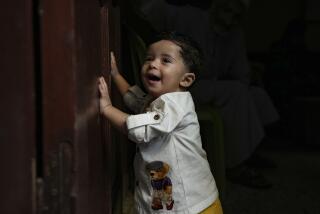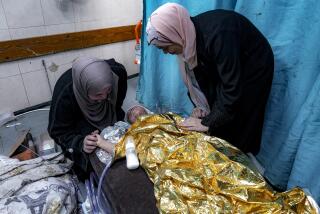War Orphan Regains Name--and Family
- Share via
PRISTINA, Yugoslavia — The last time the parents saw their towheaded toddler, his 22-year-old mother smothered his pale, limp form with kisses and left him, apparently dead, near a decapitated body in the woods.
The next time, after months of deprivation and anguish, they said he uttered a single word that made everything right: “Bab,” Albanian for “Dad.”
Found sitting alone in a field as fighting raged around him, the war orphan featured in a Times story this month was brought to a hospital where nurses cared for him. Serbian nurses gave him a popular Serbian name--Zoran. And when the Serbs fled at the end of the war, ethnic Albanian nurses renamed him Lirim, after Kosovo’s newfound freedom.
Now, the boy who will turn 2 in September has been reunited with his parents. And he has his real name back--Kastriot.
Cradling her son in her arms, Bukurie Rexhepi squeezed him tightly against herself, as if to make sure he was still there. She and family members described a journey full of harrowing escapes that separated husband from wife and both from their child but finally brought them all back together.
Here is the tale they told:
With NATO’s air war and the Serbian effort to expel Kosovo Albanians underway, Serbian shelling started in the first week of April around Kolic, the mountain village where Kastriot lived, northeast of Kosovo’s capital, Pristina.
Fearful that Serbian paramilitary troops would arrive after the shelling, as was usually the case, Bukurie and her 28-year-old husband, Afrim, joined relatives who decided to flee.
The more frail family members rode down the hill on a tractor and trailer, but Serbian police prevented them from reaching Pristina. The tractor chugged north, disappearing into a miles-long column of refugees.
Afrim and Bukurie, their son, two of Afrim’s brothers, a cousin and his wife managed to walk the 15 miles down the winding mountain road to Pristina. They slept in a house left vacant by other ethnic Albanians and headed out of town the next day in hopes of finding their relatives. Not knowing that the rest of the family had gone to the village of Sajkovac, they bypassed it and lost contact with them for nearly a month.
Their feet sore from walking, they arrived in Velika Reka, another village farther north. It had been torched and looted by marauding Serbian troops.
Here, the seven refugees huddled together for warmth at night in the charred shells of torched homes, never sleeping in the same place for more than two nights. At times, as they lay stone still on the upper floor of a house, they could hear below them the stomping boots and voices of Serbian troops.
Abedin Rexhepi, one of the brothers, said they were too numb to feel fear.
“Frankly, we didn’t care anymore,” he said.
The bigger problem was the lack of food and water. The looting of the houses had left cupboards empty, and the seven lived on morsels for nearly a week. The child grew weak.
Then, without warning, family members said, a firefight broke out between the rebel Kosovo Liberation Army and Serbian paramilitaries, sending them fleeing into the woods. The young mother struggled with the added weight of her son in her arms.
They made it undetected, but just inside the tree line was a gruesome example of the fate they were trying to avoid: A man’s body lay before them, severed head at its side.
Sick with fear, Bukurie was oblivious to the weight of her child. A few minutes passed before she looked down and realized that he didn’t seem to be breathing. Pale and unconscious, Kastriot remained limp as his panicked parents tried to revive him. As the fighting intensified and explosions echoed in the distance, Bukurie shook the boy harder, calling his name.
Still nothing.
Finally, she decided that he was dead. She covered his soft, pale face with kisses and laid his small body on the ground.
“I wish I would have been caught and had my throat cut before I would watch my child die in my hands,” Bukurie said. “We cried. But we couldn’t scream because we thought they would hear us.”
Swallowing her screams, Bukurie and the others disappeared into the forest, never looking back.
It’s hard to say when exactly Kastriot was found and in what condition. The Serbian police officers who found him have almost surely left Kosovo. The Serbian nurses are gone too, and so is the boy’s hospital paperwork, leaving no clue to the condition that led his parents to conclude that he was dead.
But somehow, whether the police heard his cries or saw him toddling in the field, he was brought to the hospital in Pristina sometime in mid-April. The pediatric ward in a dank, crumbling Communist-era building became his home. He spoke not a word, leaving it uncertain whether he was a Serb or an ethnic Albanian.
Meanwhile, Afrim and Bukurie and their relatives zigzagged across Kosovo, trying to avoid Serbian offensives. They said they talked about going back for the boy’s body but never felt that they could do it safely.
Once, again having gone days without food, they were fed by KLA soldiers. When the soldiers moved on, so did they. They stayed for a week in a village where an aunt lived.
From there, the brothers ventured back to Kolic to assess the damage, leaving the women behind. While they were gone, Serbian troops surrounded the village where the women were. Bukurie was sent on to yet another village.
Bukurie, who was reunited with her husband and family about two weeks after North Atlantic Treaty Organization troops occupied Kosovo on June 12, said of her son: “Always, always, always, I thought about him.”
But he was gone.
Or so she thought.
As refugees returned from camps in Macedonia and Albania, and tales of wartime atrocities spread, a young doctor at the hospital in Pristina heard of a family from a village near her own who had lost a child in the war. It made her think of the little boy she knew as Lirim, the war orphan.
The doctor, whom the parents know only as “Buqe,” contacted one of their cousins Monday and told him of her hunch.
In the car on the way to the hospital this week, Afrim Rexhepi tried to suppress the hope surging inside him.
“I was telling myself, until I go there and see him, I will not believe that this is my son,” he said. Those doubts vanished with the utterance of the single word.
“Bab,” Kastriot said to his father--”Dad.”
Their home in Kolic gutted by fire, and with Bukurie pregnant, the Rexhepis have moved into an abandoned house in a slum on the outskirts of Pristina. Thirteen family members share two rooms.
For now, though, there are few complaints about the horrors of the war or its aftermath. Family members crowded around, beside themselves with joy, as they related the story to reporters who dropped in unannounced. Reunited with his parents for only four days, the affectionate little boy appeared completely comfortable in his mother’s arms.
“I couldn’t imagine a better ending,” she said.
More to Read
Sign up for Essential California
The most important California stories and recommendations in your inbox every morning.
You may occasionally receive promotional content from the Los Angeles Times.














